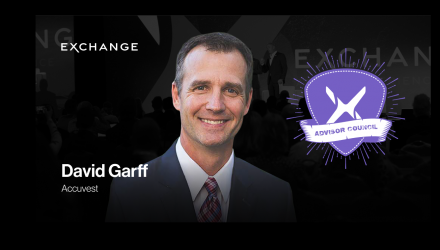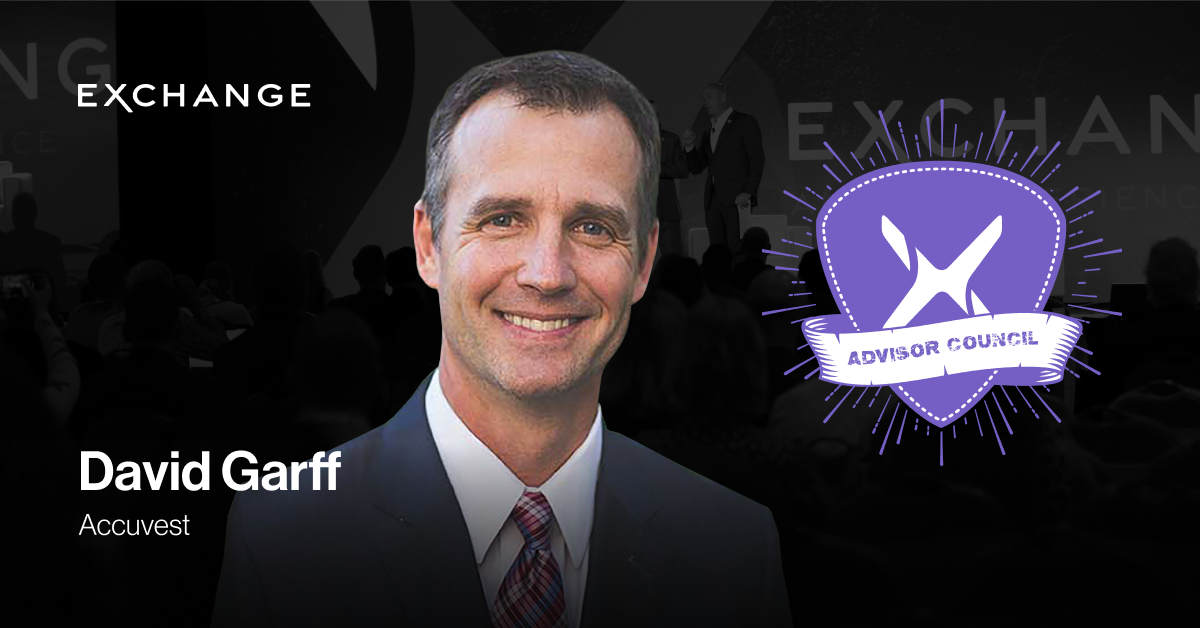Evan Harp is sitting down with the Exchange Advisor Council members. His goal is to learn their backstories, what they plan to bring to Exchange, and to unpack some of their market views. This week he spoke to Accuvest Global Advisors President David Garff.
Evan Harp: Tell us a little bit about how you got to where you are.
David Garff: So that’s a pretty long story. I started the business in 1992. I came out of college as an economics and Spanish translation major. And thought I was going to manage portfolios at Merrill Lynch. My first job as a financial advisor was with a team. They handed me a phone book and told me it was my job to get appointments for their retirement plan consulting business.
That was way different than I thought it was going to be. I spent three years working with that team. Then I decided to go work on a team with my uncle. He worked with a multifamily office for wealthy Latin families. They didn’t call it that back then in the early-mid 90s. But that’s what he was working with.
I wanted to go to grad school at night. So, I moved from Merrill Lynch to Salomon Smith Barney. I went to Berkeley to get my MBA, doing their part-time program. So not a watered-down EMBA, it’s a regular MBA, we just do it in the evenings and weekends over three years. For two and a half years, I did that and continued to work in the business. In 2004, the client that I was servicing back then, the family office, approached me and said, “Hey, we want to do a few things. We want to institutionalize a few things. We want to launch a hedge fund and we want to do some other investments. Are you interested?”
And so I left in 2005 to start Accuvest, and they seeded the business. It is now in its 18th year. Starting from that first $37 million, now we’re at half a billion. But we’re not some huge success story. We’re not the greatest marketers. Heck, we’re not the greatest portfolio managers even. How we stand out is we do a good job, we try to be very consistent, disciplined, and repeatable in everything. We have tried and failed a lot of things. We’ve launched an ETF. Then we launched another ETF with a different issuer. Neither of those ever got any traction in size.
But also, aside from what’s going on in Accuvest, I work with what we call the Mosaic Alliance. The Mosaic Alliance is a group of companies that serve this very client base that we were servicing initially. It’s not just a trust company in Alaska, but also a corporate services business or a fund administration business in the Bahamas. Under its umbrella is a broker-dealer in the Bahamas and partnerships in Mexico. Not to mention an investment bank and an insurance company in Uzbekistan.
What I do at Accuvest is my focus. But we also have a lot of other business that we do with partners from different countries that bring clients that want to use the platform that we built. So, I’ve spent the last few years working on building an international TAMP.
I’m not sure how much of that is really relevant to the people out there, but it does give a view into the business that’s maybe a little bit unique in the sense that I’m dealing with individual clients, but also dealing with the business issues related to multi-jurisdictional trusts, broker-dealer issues in foreign jurisdictions, and then partners that are living full time in a time zone 12 hours away from us.
David Garff on Exchange and the Advisor Council
Harp: What inspired you to join the Exchange Advisor Council?
Garff: The EAC is people who I respect in the business, who I think could put on a better event than has historically been put on. If I can be helpful in that, then that’s great. But it’s not like I’m looking to be a voice for the business or a voice for advisors or a spokesperson for anything. If it was another group of people, I probably wouldn’t have done it.
I’ve only done two of these. One with a group that used to be called the Investment Management Consultants Association, but is now the Investments & Wealth Institute. I worked on the content committee for their national conference for three years. That was an organization that I liked and believed in and the people that asked me to do it were friends.
Harp: What has Exchange historically done well?
Garff: I think it has frequently brought fresh views or non-traditional content to something that looks, feels, and smells the same as it did 15 years ago.
A Tale of Two Conferences (And How to Make Them Both Better)
Harp: What positive changes to Exchange are you most looking forward to advocating for?
I believe there are two conferences here and there should be a place for both. One conference is for people that want content and want to think. Then the other is for people that want to network.
My hope is that we’ll figure out a way to help people meet their objectives and needs and satisfy their reasons to go to a conference by creating more… I’m going to call it smaller groups or more affinity-type groups. That will allow people to have real conversations about the issues they’re facing and to come away with ideas on how to make their business better. Whether that’s in the way to build a portfolio or the way they market or they hire people.
Whatever the case may be, I hope we can provide an opportunity for new relationships to be built with people that share the same stage of business life. In this business, there are lots of people that have $100 million that want to go to $500 million. They don’t know how to do it and they’re all facing the same challenges. Having those people get together in an environment where they feel safe enough to share their concerns and talk through issues could be helpful.
But what I think is important is that there’s a place where people can be vulnerable. This is a very professionally isolating business. If you’re having trouble, you don’t talk about it to anybody. You don’t talk about it to your spouse, you don’t talk about it to your partners. It’s very, very difficult to find people that you can trust and say, “Hey, this is really not going well, and I don’t know how to fix it.” Creating an environment for people to create those relationships or have those conversations is important.
David Garff on Critical Debate
Harp: As an advisor, what market trend or story do you feel is going under the radar?
Garff: It seems like, with all the content that’s out there, nothing goes under the radar. I think there’s a distinct lack of… I’m not going to say critical thought. I’m going to say more like a critical debate about what’s going on in the world without it being argumentative, personal, and political.
I think the trend towards polarization, which is happening in our society, has ramifications in the financial markets that we’re not fully aware of. If we aren’t careful, we, as advisors, are going to miss out on opportunities, because we just have a framework in the way we think that doesn’t allow for ideas that are outside of our purview right now.
Lacrosse and Golf
Harp: What hobby have you spent the most time in your life pursuing?
Garff: I loved being involved with the game of lacrosse as a player and coach since the early 80s. Our son played his last game in 2022, so I had to take up a new hobby…although I’m still a huge fan of the game and watch every version of it from MCLA to Division 3 and Division 1 to the PLL.
But my newest interest has been to try to improve my golf game and get down to a single-digit handicap. I read Mark Broadie’s book about strokes gained and found it fascinating. Maybe that’s because he’s a finance guy using a quant method to measure how good each shot is. Anyway, I’m using video analysis and the Arccos app to track my game and quantify my strengths and weaknesses. The video and numbers don’t lie. So it’s humbling when you have to come face to face with the reality of how you swing or how you play the game. But I love it…for now.
For more news, information, and analysis, visit VettaFi | ETF Trends.

